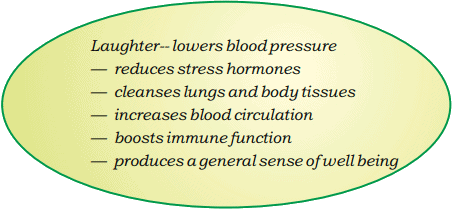Laughter-The Best Medicine NCERT Solutions | Communicative English for Class 10 PDF Download
Textual Exercises
A1. Read the following poem. Take turns in reading them aloud with your partner and ensure that you put in the right sort of feelings and emotions and voice modulations and intonation to make your partner laugh heartily.
Ans: Students to read the text on their own.
A2. Discuss with your partner which part of the poem you liked the most and give reasons for your preference.
Ans: Classroom activity. The following information shall he useful in assessing the poem.
In a way, the entire poem is beautiful seeing the subject and its musical aspects. However, the last part is the most likable. It is the climax and underlines the fact that the narrator has been riding all the time, yet he is where he had begun from. This is also because of his realizing that whatever he had been doing was a crime though a muddle-head he was. It means that he regains some sensibility. This redeems his muddle-headedness.
A3. Humor is infectious. The sound of roaring laughter is far more contagious than any cough, sniffle, or sneeze. When laughter is shared, it binds people together and increases happiness and intimacy. In addition to the domino effect of joy and amusement, laughter also strengthens your immune system, boosts energy, and protects you from the damaging effects of stress. Best of all, this priceless medicine is fun, free, and easy to use. Given below the table are the benefits of laughter in a jumbled form. Complete the table by putting them in the relevant column.
- Boosts immunity
- Strengthens relationships
- Enhances teamwork
- Relieves stress
- Helps defuse conflict
- Eases anxiety and fear
- Promotes group bonding
- Lowers stress hormones
- Decreases pain
- Improves mood
- Adds joy and zest to life
- Attracts others to us
- Enhances resilience
- Relaxes your muscles
- Prevents heart disease
Ans: 
A4. Read the following article "Fundamentals of Laughter Yoga"
Ans: Students to read the text on their own.
A5. Given below in jumbled form are the sub-headings for the paragraphs of the article that you just read. Arrange the headings in the right order against the paragraph numbers :
(para 4) The unconditional nature of joy
(para 6) Healing power of laughter yoga
(para 2) Laughter-Positive Impact-making members refreshed
(para 5) The conditioned Mind
(para 1) The link between Body and Mind
(para 3) Spontaneous laughter
Ans:
(para 1) The conditioned Mind
(para 2) Laughter-Positive Impact-making members refreshed
(para 3) The link between Body and Mind
(para 4) The unconditional nature of joy
(para 5) Spontaneous laughter
(para 6) Healing power of laughter yoga
A6. Now, write an e-mail to your overstressed sister who is preparing for her Class XII exams, suggesting that she join a laughter club to combat her anxiety. You may use the following cues along with your own ideas.
Ans:
Date : 10 January, 20 —
From : praveenl2@gmail.com
Subject : joining laughter club to combat anxiety
To : romal3@yahoo.com
Dear Roma
I hope all at your side are fine. I felt a little distressed to know that you are under stress due to your preparing for your class XII examinations. You’ll agree with me that stress is more because of a worrying nature and a tendency to be sad and fallen. Just imagine if you tend to be more stressed what gain you will get ! No gains except more sadness and frustration. So stop worrying about those things that are to happen in future. We, you know, can’t foresee future happenings. What is important is cheerfulness and happiness. We should not spoil our present for the sake of future as we can’t see it.
I, therefore, advise you to feel light in every way. Join a laughter club as it is a panacea for these modern diseases. Laughing lowers blood pressure. It reduces stress hormones and cleanses lungs and body tissues. It also increases blood circulation and boosts immune function. In a way, laughing produces a general sense of well-being. One feels fresh zest and enthusiasm thereafter. You yourself will see a sea change in your body after a few days on joining this club. All of us here are already the members of this club.
With best wishes
Yours affectionately
Praveen
|
8 videos|250 docs|8 tests
|
FAQs on Laughter-The Best Medicine NCERT Solutions - Communicative English for Class 10
| 1. What is the main theme of the article "Laughter-The Best Medicine"? |  |
| 2. How does laughter benefit physical health according to the article? |  |
| 3. Can laughter impact mental health? If so, how? |  |
| 4. What role does humor play in social interactions as mentioned in the article? |  |
| 5. Are there any specific examples of how laughter has been used therapeutically? |  |





















